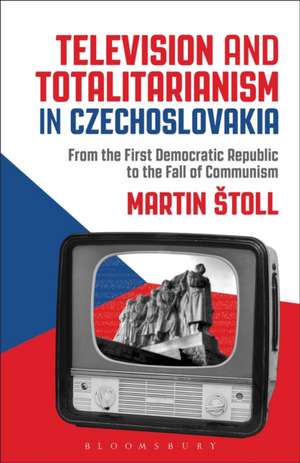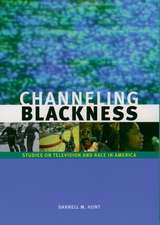Television and Totalitarianism in Czechoslovakia: From the First Democratic Republic to the Fall of Communism
Autor Martin Štollen Limba Engleză Hardback – 17 oct 2018
| Toate formatele și edițiile | Preț | Express |
|---|---|---|
| Paperback (1) | 225.41 lei 6-8 săpt. | |
| Bloomsbury Publishing – 28 oct 2020 | 225.41 lei 6-8 săpt. | |
| Hardback (1) | 776.65 lei 6-8 săpt. | |
| Bloomsbury Publishing – 17 oct 2018 | 776.65 lei 6-8 săpt. |
Preț: 776.65 lei
Preț vechi: 1114.61 lei
-30% Nou
Puncte Express: 1165
Preț estimativ în valută:
148.61€ • 155.17$ • 122.72£
148.61€ • 155.17$ • 122.72£
Carte tipărită la comandă
Livrare economică 15-29 aprilie
Preluare comenzi: 021 569.72.76
Specificații
ISBN-13: 9781501324758
ISBN-10: 1501324756
Pagini: 304
Ilustrații: 89 bw illus
Dimensiuni: 152 x 229 mm
Greutate: 0.68 kg
Editura: Bloomsbury Publishing
Colecția Bloomsbury Academic
Locul publicării:New York, United States
ISBN-10: 1501324756
Pagini: 304
Ilustrații: 89 bw illus
Dimensiuni: 152 x 229 mm
Greutate: 0.68 kg
Editura: Bloomsbury Publishing
Colecția Bloomsbury Academic
Locul publicării:New York, United States
Caracteristici
Covers both the technological and chronological development of television in Czechoslovakia, as well as its use for propaganda by the socialist authorities
Notă biografică
Martin Stoll is Professor at the Institute of Communication Studies and Journalism in the Faculty of Social Sciences, Charles University in Prague, Czech Republic. He specializes in documentary film, history and theory, television studies and historical contexts of television broadcasting. He has lectured at universities in Great Britain, Finland, Poland and Slovakia, and was Principal of the Literary Academy (The Josef Skvorecký Private College). He has also worked as commissioning editor for Czech Television and has directed fifty-five documentary films.
Cuprins
List of AbbreviationsAcknowledgementsIntroductionPart One: Why Don't We Have Television?1 - Radio Context: One Million Listeners2 - Pioneers of Television3 - Television as Political MatterPart Two: Will Television be Based on Nazi Devices?4 - In the Hands of the Military5 - Post-war UncertaintyPart Three: Television Should Serve Communist Ideology6 - Context of Soviet Patterns in the Television Space of the Eastern Bloc7 - TV Birth in Stalinism8 - Experimental Broadcasting9 - Television and Political Communication10 - Birth of the TV Nation11 - Occupation in 196812 - Television as the Last Instrument of PowerPart Four: Toward Public Service13 - Television as a Participant of the Velvet Revolution14 - Birth of the Public BroadcasterConclusionAppendixBibliographyIndex
Recenzii
This is the first comprehensive English-language survey of Czechoslovak television's history, covering the whole cycle of transition from the First Republic to democracy. In such a way the book serves as a political and cultural introduction to the history of Czechoslovak television, providing a kind of master narrative of the topic . An interesting, readable and thought-provoking introduction both to the history of the medium and to the cultural history of Czechoslovakia and Eastern Europe.
A remarkable account, including the history of early efforts in interwar Czechoslovakia to introduce TV broadcasting to a technologically advanced country. Martin Stoll shows that television broadcasting in the post-war period was far more than a crude propaganda tool abused by the communist regime for its purposes. An important study which breaks stereotypes.
Well-researched ... A substantial point of reference to any scholar interested in studying media history and public communication in Czechoslovakia in the twentieth century.
Offers an impressive, almost encyclopaedic, account.
A remarkable account, including the history of early efforts in interwar Czechoslovakia to introduce TV broadcasting to a technologically advanced country. Martin Stoll shows that television broadcasting in the post-war period was far more than a crude propaganda tool abused by the communist regime for its purposes. An important study which breaks stereotypes.
Well-researched ... A substantial point of reference to any scholar interested in studying media history and public communication in Czechoslovakia in the twentieth century.
Offers an impressive, almost encyclopaedic, account.
















